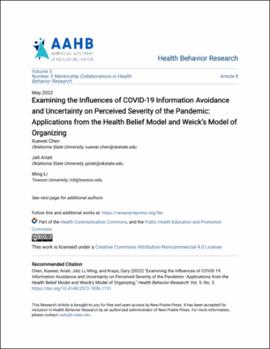| dc.contributor.author | Chen, Xuewei | |
| dc.contributor.author | Ariati, Jati | |
| dc.contributor.author | Li, Ming | |
| dc.contributor.author | Kreps, Gary | |
| dc.date.accessioned | 2022-10-18T21:58:07Z | |
| dc.date.available | 2022-10-18T21:58:07Z | |
| dc.date.issued | 2022-08-30 | |
| dc.identifier.citation | Chen, X., Ariati, J., Li, M., Kreps, G. (2022). Examining the Influences of COVID-19 Information Avoidance and Uncertainty on Perceived Severity of the Pandemic: Applications from the Health Belief Model and Weick’s Model of Organizing. Health Behavior Research, 5(3). https://doi.org/10.4148/2572-1836.1151 | |
| dc.identifier.uri | https://hdl.handle.net/11244/336570 | |
| dc.description.abstract | Public health responses to the COVID-19 pandemic have been insufficient at keeping the virus from spreading rapidly and threatening public health around the globe. Not only has society been challenged by biomedical issues of disease contagion, infection, morbidity, and mortality, but has also confronted complex cognitive challenges to making sense of this health threat, especially related to accurately evaluating and responding appropriately to the severity of the pandemic. Perceived severity is an important cognitive factor associated with public willingness to adopt needed prevention, protection, and treatment behaviors for responding to serious health risks, like COVID-19. Information avoidance and uncertainty are important constructs from powerful public health and communication theories, including the health belief model and Weick’s model of organizing, that guide this study by describing how information influences responses to health threats. We used survey data collected from 561 college students to clarify the relationships among information avoidance, beliefs about unpredictability, and the perceived severity of COVID-19. We found that higher information avoidance was associated with lower perceived severity, and that this association depended on people’s unpredictability beliefs. Specifically, for those who had low assessments about unpredictability, we observed a strong negative association between information avoidance and perceived severity. Among those who had high perceived unpredictability levels, we observed a weak negative association between information avoidance and perceived severity. This study evaluates influences of information avoidance and uncertainty on perceived severity of COVID-19. The findings can help guide strategies for enhancing public response to this pandemic and future health threats. | |
| dc.format | application/pdf | |
| dc.language | en_US | |
| dc.publisher | New Prairie Press | |
| dc.relation.ispartof | Health Behavior Research, 5 (3) | |
| dc.relation.uri | http://dx.doi.org/10.4148/2572-1836.1151 | |
| dc.rights | This material has been previously published. In the Oklahoma State University Library's institutional repository this version is made available through the open access principles and the terms of agreement/consent between the author(s) and the publisher. The permission policy on the use, reproduction or distribution of the material falls under fair use for educational, scholarship, and research purposes. Contact Digital Resources and Discovery Services at lib-dls@okstate.edu or 405-744-9161 for further information. | |
| dc.title | Examining the influences of COVID-19 information avoidance and uncertainty on perceived severity of the pandemic: Applications from the health belief model and Weick’s model of organizing | |
| dc.date.updated | 2022-10-03T15:36:56Z | |
| dc.identifier.doi | 10.4148/2572-1836.1151 | |
| dc.description.department | Community Health Sciences, Counseling and Counseling Psychology | |
| dc.type.genre | Article | |
| dc.type.material | Text | |
| dc.identifier.author | ORCID: 0000-0001-6391-1459 (Chen, Xuewei) | |
| dc.identifier.author | ScopusID: 56937495300 (Chen, Xuewei) | |
